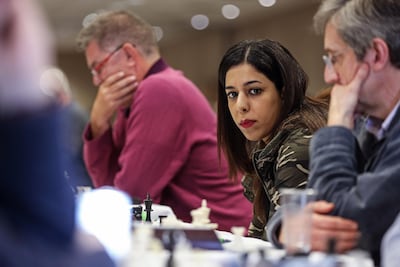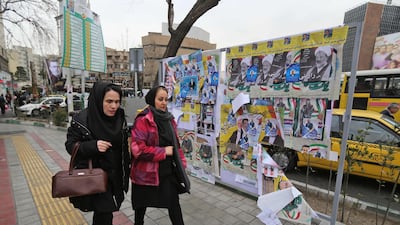A video of an unknown Iranian woman defending herself against a man who attacked her on the streets has gone viral. She has allegedly been assaulted by a vigilante for wearing a loose hijab.
The footage shows a woman crossing path with a man, who then follows her down the street and appears to threaten her. He then grabs her by the arm and kicks her in the stomach twice, propelling her onto the road.
During the remaining minute and a half of the video, the woman fights back against her assailant, throwing punches and kicks his way, before walkers-by intervene.
The footage has garnered 2.6 million views in less than 24 hours.
US-based Iranian journalist and political activist Masih Alinejad tweeted that she has been in touch with the 42-year-old woman in the video. Alinejad, who last month wrote a column in The National about a boycott movement in Iran ahead of the parliamentary elections, says the police refused to arrest the attacker as he claimed to be "voluntarily enforcing morality codes".
Wearing a hijab in public is mandatory in Iran. Women who fail to cover their hair can face up to 10 years in prison, on charges of “inciting corruption and prostitution".
The country's dresscode law has been decried by women's rights activists for providing legal justification to take away the rights of women, and subjecting them to constant harassment. Yet authorities have maintained that the hijab should be compulsory, even for non-Muslim and non-practising women. Iran's supreme leader Ayatollah Ali Khamenei has even insisted that the hijab is the answer to end sexual violence against women.
In January, Iranian chess referee Shohreh Bayat faced an intimidation campaign after photographs of her taken at the Women's World Chess Championship in China appeared to show her without a veil. The 32-year-old decided to flee her home country and seek asylum in London.
Ms Bayat is not the only woman whose life and career were on the line because of clothing preferences.
Kimia Alizadeh, Iran's only female Olympic medallist, defected from her country in January. In an Instagram post, she criticised prevalent sexism in Iran and spoke out against compulsory hijab. The 22-year-old said she was "one of the millions of oppressed women in Iran".

In the summer of 2017, Ms Alinejad launched the White Wednesday Campaign to protest against compulsory hijab. Iranian women posted pictures of themselves wearing white headscarves or pieces of white clothing online under the hashtag #WhiteWednesday to make their voices heard. But instead of engaging with them, authorities clamped down on the peaceful activists.
According to Human Rights’ Watch, Iranian courts have given harsh sentences to dozens of women who peacefully demonstrated for their right to take off the veil.
In August, 22-year-old Saba Kordafshari was sentenced to 15 years in prison for removing her scarf in public. The following month, 29-year old Sahar Khodayari, who came to be known as Iran’s “Blue Girl", set herself on fire in court, where she faced imprisonment for trying to attend a football match in March. Her death triggered international outcry.
“Next time they tell you compulsory hijab is a small issue, show them this video,” Ms Alinejad tweeted. “Many Iranian women face this.”
Aya Iskandarani is a staff Comment writer at The National



